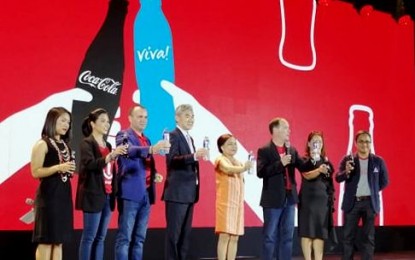
ROADMAP LAUNCH. Coca-Cola Philippines president and general manager Winn Everheart (3rd from left) leads the ceremonial toast to culminate Tuesday's launching at Blue Leaf Filipinas Hotel, Parañaque City, of a comprehensive blueprint towards packaging sustainability to help boost the PH recycling industry. Also in the photo are Senator Cynthia Villar (center), United States Ambassador to the Philippines Sung Kim (4th from left) and other Coca-Cola officials and guests. (PNA photo by Gladys S. Pino)
MANILA -- Beverage giant Coca-Cola Philippines launched on Tuesday one of its important commitments to help boost the country’s recycling industry aimed at increasing job generation for Filipinos and consequently reduce plastics in the ocean.
At the Blue Leaf Filipinas in Parañaque City, the company announced its comprehensive blueprint towards packaging sustainability, which targets to collect and recycle a bottle or can for each one they sell and to use at least 50 percent recycled content in their packaging by 2030. This is the cornerstone of the company's global vision of a World Without Waste.
Acknowledging the country’s packaging waste problem, Coca-Cola Philippines president and general manager Winn Everheart believes that “as a company, we have a responsibility to help solve it”, as he discussed the ambitious action plan that seeks to transform the way its sees recyclable packaging - from a one-time, disposable use to a valuable resource with limitless use and possibilities.
The beverage company, which has considered the Philippines its home for more than 100 years, is introducing more sustainable packaging innovations, supporting information and education programs, and building waste management capabilities in communities.
The company’s “simple, however very ambitious” global vision of World Without Waste” is addressing this complex challenge by organizing three key areas: design, collect and partner.
“We want to design a better bottle with great technology to help produce the need for zero waste plastic altogether," Everheart said.
The company shall also help create or improve collection systems around the Philippines.
“So we can collect and recycle a bottle or can for each one we produce,” he added.
Lastly, the company shall work with other companies, organizations, governments and local communities to raise awareness and find solutions that will promote a healthy and free environment.
The company has partnered with concerned line agencies and non-government organizations and is currently building partnership with 12 provinces, and later with the remaining 69 other provinces.
The company, through its bottling arm Coca-Cola Beverages Philippines (CCBPI) has also recently announced its plan to invest in a PHP1-billion next generation, state-of-the-art, food-grade recycling facility in the country that will transform used recyclable PET plastic bottles into new and useful beverage bottles again.
Institutionalizing a sustainable economic system of recycling is seen to lead to the improvement of the country’s polyethylene terephthalate (PET) plastic bottles collection and recycling rates.
It will also lead to increased job generation for Filipinos and the development of an inclusive system that will help uplift the livelihood of workers across the waste materials value chain, ultimately contributing in the improvement of the country’s recyclable plastic collection and recycling rates, and consequently reducing ocean plastic leakage. (PNA)
